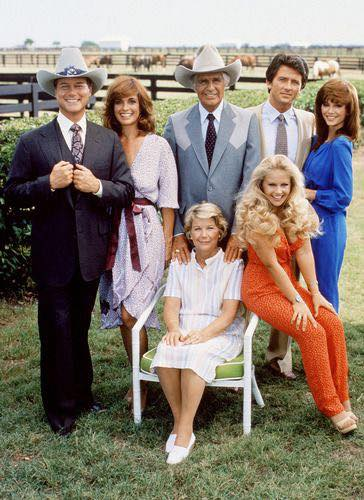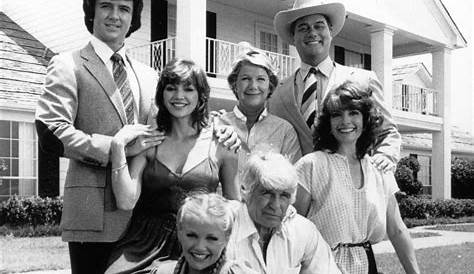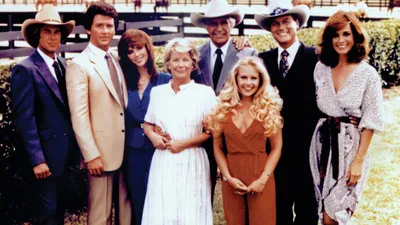With its stories of power, treachery, and family drama, Dallas, the legendary American prime-time soap opera, enthralled viewers for more than ten years. The series, which ran on CBS from April 2, 1978, to May 3, 1991, was more than just a television program; it was a cultural phenomenon. Dallas, which focused on the affluent and troubled Ewing family from Texas, had a lasting impression on television history by fusing personal strife with high-stakes business.
The Bold Beginnings of Dallas

Nobody foresaw Dallas’s seismic impact when it debuted as a five-part miniseries. The series, which was originally scheduled for late Sunday nights, centered on the conflict between the Barneses, a family that had a long-standing animosity toward the Ewings, a strong oil dynasty. The forbidden relationship between Bobby Ewing and Pamela Barnes, whose union represented optimism despite centuries of rivalry, was at the center of everything.
The show’s blend of romance, mystery, and money resonated with viewers, and CBS decided to commission a full series. Dallas established itself as the benchmark for prime-time drama over the course of 14 seasons.
The Ewing Dynasty: Wealth, Power, and Dysfunction
The Ewing family, a representation of privilege and conflict, was at the heart of Dallas. Under the leadership of matriarch Miss Ellie and patriarch Jock Ewing, the family’s relationships were filled with ambition, strife, and sporadic emotional moments.
Larry Hagman’s portrayal of J.R. Ewing was the show’s most popular character. As the cunning oil magnate, J.R. used family members, acquaintances, and enemies to achieve his goals, making him one of the most recognizable villains on television.
Bobby Ewing: The family’s moral compass, Bobby was the complete opposite of J.R. The drama was counterbalanced by his love story with Pamela Barnes, which represented harmony in the face of upheaval.
The show was anchored by Barbara Bel Geddes and Jim Davis’s portrayals of Miss Ellie and Jock Ewing, who exemplified tradition and fortitude while navigating the family’s ongoing problems.
Because of their money and influence, the Ewings’ interpersonal conflicts were compellingly set against a setting that immersed the spectator in the family’s story.
Cliffhangers That Changed Television
Dallas is the only program that has perfected the cliffhanger. Episodes of the show became cultural events as audiences eagerly awaited their resolutions.
“J.R. was shot by whom?”
When J.R. was shot by an unidentified attacker in the season three finale, it caused a worldwide uproar. Over 90 million people watched the disclosure, making it one of the most-watched shows in TV history, and the subject “Who shot J.R.” dominated discussions for months.
The Death and Return of Bobby
Fans were shocked by Bobby’s terrible demise at the end of season eight. His comeback in season nine, which was disclosed as a part of Pam’s dream, became one of the most contentious yet memorable turns in television history, in typical soap opera form.
Other Startling Conclusions
Dallas solidified its status as the king of cliffhangers by making sure that every finale was an event that viewers had to watch, complete with flaming explosions and unexpected fatalities.
Themes of Betrayal, Family Feuds, and Power

Fundamentally, Dallas examined universal topics that people found compelling. The Ewings’ personal lives were a maze of treachery and heartache, while their oil empire stood for ambition and greed. Much of the drama was fueled by the generational friction created by the long-running conflict between the Ewings and the Barneses, which was based on Jock Ewing’s claimed betrayal of Digger Barnes.
This complex web of commercial conflicts and personal grudges produced a story that was both expansive and intensely intimate, making Dallas appealing to a broad audience.
A World Event and Cultural Turning Point
Dallas became a global sensation in addition to being a hit in the US. One of the most successful exports in television history, its mix of glitz, drama, and suspense enthralled audiences in more than 90 nations.
Innovation in Television
The program opened the door for later dramas like Breaking Bad, The Sopranos, and Dynasty by demonstrating that serialized narrative could succeed in prime time.
Icon of Pop Culture
The question, “Who shot J.R.?” became part of the cultural language, signifying the show’s widespread impact. Dallas was mentioned in music, films, and even political conversations.
Accolades
Dallas cemented its legacy in television history with four Emmy Awards, numerous Golden Globe nominations, and broad critical praise.
Revivals and Spin-Offs

Dallas’s success led to the creation of Knots Landing, a spin-off that made its premiere in 1979. Knots Landing, which ran for 14 seasons and became popular in its own right, focused on the life of middle son Gary Ewing away from Southfork Ranch.
Dallas was brought back to life by TNT in 2012 with a continuation series that, while maintaining the essence of the original, featured a new generation of Ewings. Despite its brief three-season run, the resurrection exposed the renowned family to a new audience and reignited interest in the brand.
Dallas’s Enduring Allure
Dallas continues to be a benchmark of television greatness decades after its conclusion. Its blend of gripping characters, intense drama, and innovative narrative established a benchmark that many television programs still follow.
Fans were left on yet another suspenseful cliffhanger in the 1991 season finale. Although it signaled the conclusion of the first run, Dallas solidified its reputation as a series that gripped audiences until the very end.
In summary, a legacy that influenced television
From the expansive Texas vistas to the glitzy Ewing Oil boardrooms, Dallas enthralled millions with tales of ambition, treachery, and familial devotion. Dallas has something to offer everyone, regardless of whether you were captivated by Bobby’s unwavering principles, J.R.’s crafty plots, or the never-ending feuds.
Dallas was more than simply a soap opera; it was a portrayal of the intricacies of familial relationships, power, and greed. Unquestionably, it has influenced television narrative, and both viewers and new generations of producers are still motivated by its legacy. Dallas was more than simply a spectacle to those who saw it; it was an occasion, demonstrating that great tales never really come to an end.
